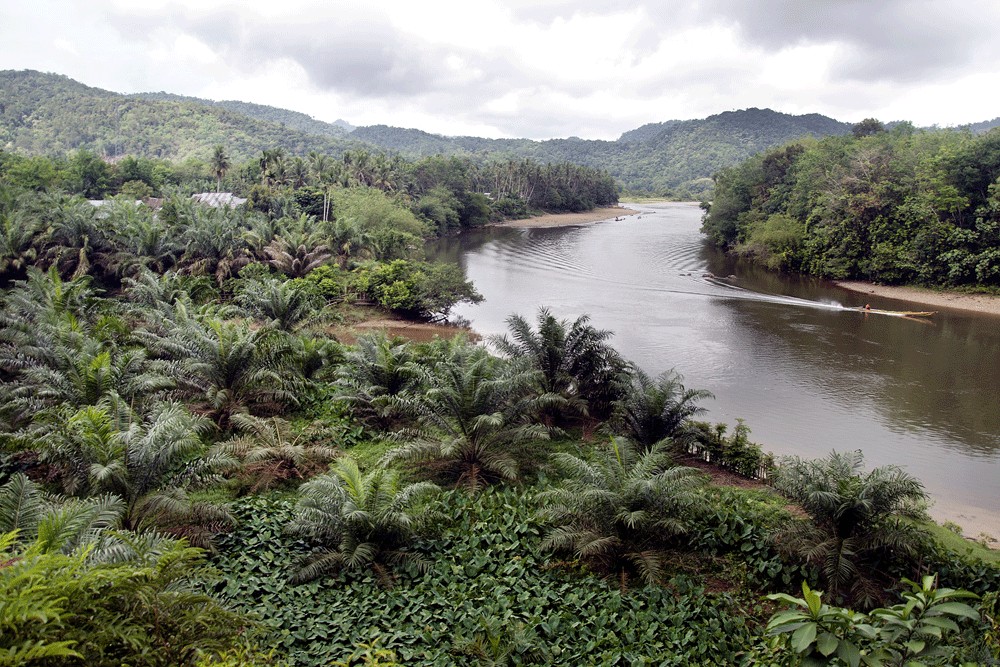Popular Reads
Top Results
Can't find what you're looking for?
View all search resultsPopular Reads
Top Results
Can't find what you're looking for?
View all search resultsSecrecy still shrouds land use maps
Change text size
Gift Premium Articles
to Anyone
T
he General Elections Commission (KPU) has done good service by ensuring that the environment was a focus in its most recent presidential debate. Public attention has swung onto a critical question: who controls our land and forests, and are they acting responsibly?
Access to data on land titles, combined with satellite imagery, can show not only where peat and forest fires are breaking out or forests are being cleared, but also reveal who is responsible for that land.
Ironically, President Joko “Jokowi” Widodo exposed his administration’s shortcomings on the two issues of land titles and forest fire prevention when he attempted to use them as a weapon in his campaign.
First, during the debate Jokowi “outed” his opponent Prabowo Subianto as controlling hundreds of thousands of hectares in Sumatra and Kalimantan. In gaining access to and revealing this data, he appeared to have sidestepped his own administration’s stubborn refusal to make land title data public.
Prabowo conceded he controlled the land via a plantation industry title known as land cultivation right (HGU). Yet HGU data has been locked away by the National Land Agency under the control of Jokowi’s own agrarian and spatial planning minister.
As the President has implicitly admitted through his comments, access to this data is a matter of public interest. He’s not alone in that view.
For years civil society has been demanding access to HGU maps and data, with NGOs such as Forest Watch Indonesia (FWI) and Greenpeace Indonesia taking action via freedom of information law to fight for this right.
And it turns out that our top judges agree — on March 6, 2017 the Supreme Court ordered the National Land Agency to release HGU data to the public, the culmination of FWI’s legal battle.
Flouting the law, however, Jokowi’s administration has steadfastly ignored the judiciary and almost two years later still refuses to comply by releasing HGU information.
Jokowi’s dogged secrecy over land use maps is all the more frustrating because it is a breach of a key promise made during the pre-election debate four years ago.
At that time, Jokowi promised that he would release maps to the public via the One Map initiative. That claim was repeated when he finally launched the long-awaited initiative in December last year.
Jokowi’s administration has steadfastly ignored the judiciary.
And Luhut Pandjaitan, one of Jokowi’s most trusted ministers repeated the claim on Wednesday, when he was quoted saying of land title data “Now, with the One Map policy, note this, it is public data” — and even went so far as to suggest the public could “google” to discover who controlled land via the One Map.
Unfortunately, the reality is quite the opposite. As is made clear via Jokowi’s own presidential decree, and confirmed via the official handbook, the One Map is closed to the public, accessible only to a specific list of seven branches of government.
Prabowo could distinguish himself by announcing a firm commitment to transparent government — but given he also benefits from backers with extensive land holdings, it seems unlikely he would be willing to do so.
The second foot-in-mouth moment came when Jokowi claimed he had taken firm measures to prevent forest fires.
During the debate, the president claimed he’d ended the disaster of recurring deadly forest fires and haze over the past three years. NGOs including Greenpeace were quick to point out that this claim was far from accurate.
In fact, nearly 150,000 ha of land burned within palm, pulp and logging concessions during 2016 and 2017.
Figures for 2018 are yet to be made public by the government, but the number of hotspots observed by satellite suggests a significant increase, outstripping the previous two years combined. And there is no end in sight — smoke from this year’s fires is reportedly already at serious levels in parts of Sumatra.
These fires do terrible damage to health, wildlife, forest and peat landscapes and to the global climate. It is critical that further fire damage is prevented, and damaged landscapes repaired. Plantation companies will quickly toe the line if they are made to pay compensation for fire damage to land they control. Yet this most powerful tool has been mishandled by the government.
During the debate, Jokowi stated that his administration had succeeded in sanctioning 11 companies to the tune of Rp 18.3 trillion (US$1.3 billion) for illegal logging and forest fires. It is true that these civil cases for compensation were successfully fought in court.
The problem is that years after the logging and the fires, this money has not been paid. In particular, not a single rupiah has been paid by companies found liable for Rp 2.7 trillion in fires compensation. Without effective action by the government to track down assets to be seized by the courts, this money will likely remain unpaid.
Norway has finally agreed to slowly open the tap to its $1 billion fund transfer for reduced carbon emissions, which is contingent on Indonesia’s deforestation rate falling.
However, it would be foolish to ignore the larger sum of corporate compensation money which could be put to work immediately to rehabilitate burnt peatlands, or to provide the hospitals and other infrastructure needed to help the public as they face continued haze related illness and disruption.
***
The writer is global head of Indonesian Forests Campaign at Greenpeace Southeast Asia.










